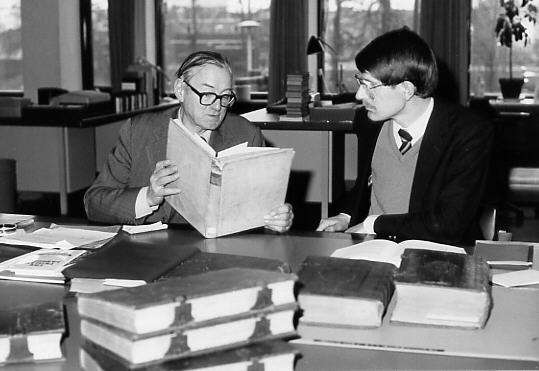>> HOMEpage
Sir ROGER MYNORS in Leeuwarden 21.2.1984
viewing five Greek Aldines from the library of ERASMUS

⇑ imagemap ⇑
Sir Roger Mynors (1903-1989) with the Dioscorides of 1499 in his hands and Martin Engels (1948), curator of manuscripts and old printing (1974-2001), in the Provinciale Bibliotheek van Friesland (now part of Tresoar). On the foreground the five volumes of Galenus (1525), before Sir Roger in a wrapper the Lucianus (1503), before M. Engels the thick Moralia (1509) and the Parallela (1519) of Plutarchus.

Treago
St. Weonards
Hereford HR2 8QB
18 August 1983
Dear Sir,
Our common interest in Erasmus must serve as my excuse for writing to you.
Your discovery, announced in the new Erasmus in English
[A newsletter published by University of Toronto Press, 12/1983, p. 19-20], of five Aldines from his library, is
like a dream, from which one fears that one will wake up, having found it 'too good to be true'.
Especially for me, who have been entrusted by the editorial board of the Toronto English
version of Erasmus with the annotation of the Adagia, for which Lucian and Plutarch are
fundamental.
So far, I have been able to follow his methods of collecting material in his Athenaeus (cited
some 400 times), which is now in the Bodleiana in Oxford - paroimia paroimia paroimia
scribbled in the margins. I hope very much that you will publish a fuller account of your
discovery, and especially of the Erasmian annotations.
 For this purpose would it be useful to have a list of the references in the Adagia to Lucian,
Plutarch, Dioscorides? I have an almost complete index of the ancient sources, and should be
very glad to send xeroxes of the sheets relating to your authors, if there is any likelihood of
being useful.
For this purpose would it be useful to have a list of the references in the Adagia to Lucian,
Plutarch, Dioscorides? I have an almost complete index of the ancient sources, and should be
very glad to send xeroxes of the sheets relating to your authors, if there is any likelihood of
being useful.
In any case, I shall hope to come and inspect the volumes one day, and to say something of
them in the introductory volume of the Toronto version, though of course I would take all
proper care not to interfere withyour works, or with anyone who may be publishing more
details of your discovery (one half of the Adagia is as yet translated for Toronto, and it will be
some years before we reach the volume of prolegomena, which comes last).
It seems but yesterday since my old friend Gerard Lieftinck reported his discovery in the same
treasure-house of the Franeker MS of Gellius, which inspired a new edition of the text in the
Oxford series.
With best wishes
Yours sincerely
Roger Mynors


9.ii.84
Dear Mr. Engels,
At last I am able to come to Leeuwarden to see the Erasmus books which you have discovered,
and hope it will be convenient for me to visit the Library on Tuesday 21 February. My plan is
to come straight from the night boat, and arrive by the 11 a.m. train.
I would like to say that I have no intentions to publish anything about these volumes (until the
Toronto project for an English version of Erasmus reaches the introductory volume of the
Adagia, in perhaps about seven years' time), and we shall all look forward to your telling us
more about them.
I will bring a copy of my lists of passages from Plutarch and Lucian used in the Adagia, in case
it may be of any use to you.
Yours sincerely,
Roger Mynors.


Martin Engels, december 2005